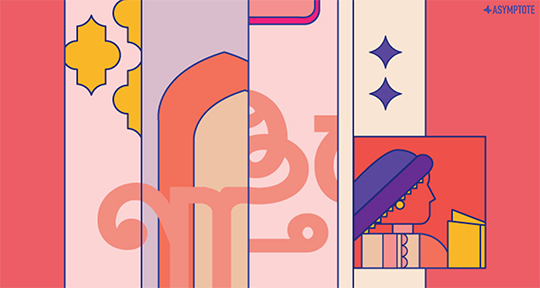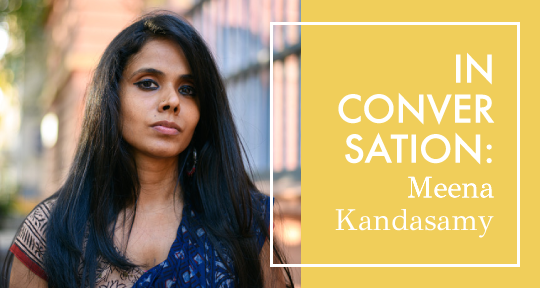Indian writer and translator Meena Kandasamy has always been interested in intimate human relations and historical lesions caused by caste, gender, and ethnic oppressions. She explores these topics in her poetry and prose with equal power and precision, most notably in her books of poems such as Touch (2006) and Ms. Militancy (2010), as well as her three novels, The Gypsy Goddess (2014), When I Hit You (2017), and Exquisite Cadavers (2019). Activism is at the heart of her literary work; she has translated several political texts from Tamil to English, and previously held an editorial role at The Dalit, an alternative magazine documenting caste-related brutality and the anti-caste resistance in India.
After translating political speeches, philosophical texts, and feminist poetry for many years, Kandasamy recently translated a novel for the first time. The novel, Salma’s Manaamiyangal (2016), translated by Kandasamy as Women Dreaming (2020), is a multigenerational narrative set in rural Tamil Nadu. Its opening thrusts readers into a woman’s nightmare, and the narrative goes on to explore the desires of a group of Muslim women and their intersecting lives. While delving into the women’s yearning for freedom, education, and dignity, Salma’s novel also unearths man’s enormous will to control by means of religious extremism, laws, and domestic restrictions. Like Kandasamy’s own novels, Women Dreaming defies the traditions of social realist fiction; if we hope for the novel to “acquaint us with characters” or offer “access to their feelings,” we will be frustrated. But Salma’s aesthetic project is a political one—the novel’s paratactic arrangement of short chapters and shifting perspectives convey the collective and interchangeable experiences of women who dream in the face of extreme adversities.
I recently corresponded with Kandasamy by email. Our conversation touched on her career as writer-translator, literary craft, and the stakes of translation.
—Torsa Ghosal
Torsa Ghosal (TG): You started translating nearly twenty years ago, beginning with the works of Tamil politician Thol. Thirumavalavan. You’ve called translation and writing “twin activities,” though you note that other people—I imagine critics, readers, publishers—saw your background in translation as an impediment to your writing career. In the last twenty years, you have written and published several books, including When I Hit You, which was shortlisted for the Women’s Prize for Fiction. As you return to translation today, do you find cultural attitudes towards it have changed? Is there more scope for translation now than there was twenty years ago?
Meena Kandasamy (MK): Definitely. I think books of translation are now treated almost on par with books originally written in English, and translators and authors are continuing the fight to get their due. I do not think the landscape was so receptive twenty years ago—political translations from left-leaning marginalized groups would be seen as a curiosity alone and not something worthy of serious reception, engagement, discussion. This change is not an attitudinal change—it is a historical necessity if we want to prevent literature and the public sphere from becoming an echo chamber of posh English-speaking elites.
TG: Do you consider the sidelining of translation within the Indian literary sphere as related to the fraught nationalist project of marginalising the voices of certain communities? I’m thinking of your comment that you “see India as a prison house of nationalities,” given that ‘India’ was constructed for British administrative purposes.
MK: The project of sidelining is not so simple with a clear-cut manifesto: let us sideline all regional languages. Voices in the Indian languages that maintain caste supremacy and Brahminical hegemony have always been translated and rendered into English—in fact, they (dangerously) become the only voices which are heard from these regional languages. This is directly connected to preserving Brahminical hegemony, and because the Indian nationalist project was in many ways only a takeover of the British administrative construct of India and a resultant consolidation of caste-class supremacy at a broader level, we find this gatekeeping rampant in the Indian literary sphere. But that’s only one way of looking at translations, and only looking at translations into the English. Militant, anti-caste thought and revolutionary content has travelled across languages without being hindered by these oppressive gatekeepers; I am thinking of Periyar’s translation and publication of the Communist Manifesto into Tamil, and of him introducing the work of Dr. Ambedkar to Tamil readers. READ MORE…




